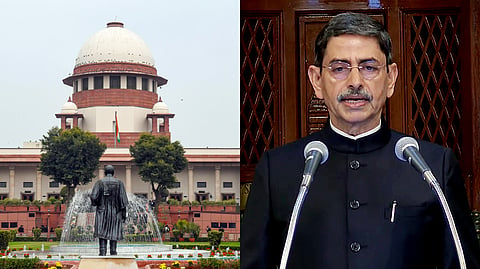

CHENNAI: In a historic first, the Tamil Nadu government has notified ten laws that were stalled by Governor RN Ravi, following a landmark Supreme Court ruling that his decision to reserve the re-adopted bills for the President's assent was unconstitutional.
The gazette notifications cite the Supreme Court’s April 8, 2025 order, which held that all actions taken by the President after the bills were reserved are non est in law (having no legal existance), and that the bills shall be deemed to have received the Governor’s assent on the day they were presented to him.
The ten laws are: The Tamil Nadu Fisheries University (Amendment) Act, 2020; The Tamil Nadu Veterinary and Animal Sciences University (Amendment) Act, 2020; The Tamil Nadu Universities Laws (Amendment) Act, 2022; Tamil Nadu Dr.Ambedkar Law University (Amendment) Act, 2022; The Tamil Nadu Dr.MGR. Medical University, Chennai (Amendment) Act, 2022; The Tamil Nadu Agricultural University (Amendment) Act, 2022; The Tamil University (Second Amendment) Act, 2022; The Tamil Nadu Fisheries University (Amendment) Act, 2023; The Tamil Nadu Veterinary and Animal Sciences University (Amendment) Act and The Tamil Nadu Universities Laws (Second Amendment) Act, 2022.
Under the newly notified laws, the Tamil Nadu government has the authority to appoint Vice-Chancellors for 18 state universities, a power that was previously vested in the Governor, who serves as the Chancellor of these institutions.
"History is made as these are the first Acts of any legislature in India to have taken effect without the signature of the Governor / President but on the strength of the judgement of the Supreme Court," tweeted DMK Rajya Sabha MP P Wilson who was also part of the advocates who appeared for the case.
At the time the state government filed a petition in the Supreme Court, 12 bills passed by the Assembly were pending with the Governor, including two that had been passed as early as 2020.
Following the court’s advice to the Governor and the state government to resolve the issue, the Governor withheld assent to 10 of the 12 bills and returned them to the Assembly while reserving the remaining two for the President’s consideration.
The two bills still pending with the President are: a bill to further amend the Chennai University Act and a bill to provide for the establishment and incorporation of a university for Siddha, Ayurveda, Unani, Yoga and Naturopathy, and Homeopathy.
After receiving the returned bills, the Tamil Nadu Assembly reconsidered and re-enacted all ten bills, which were then sent again to the Governor for his assent on November 18, 2023.
However, the Governor reserved all ten for the President’s consideration. The President subsequently withheld assent to seven bills, approved one and left two undecided. The state government argued before the Supreme Court that the Governor had no authority under the Constitution to reserve bills that had been reconsidered and re-passed by the Assembly.
In its judgment, the Supreme Court prescribed outer time limits for the Governor to act on bills, ranging from one month to three months, depending on the context. It also set a three-month deadline for the President to act on bills reserved by Governors. The apex court has also directed its registry to send a copy of the judgment to all High Courts and the Principal Secretaries to the Governors of all states.